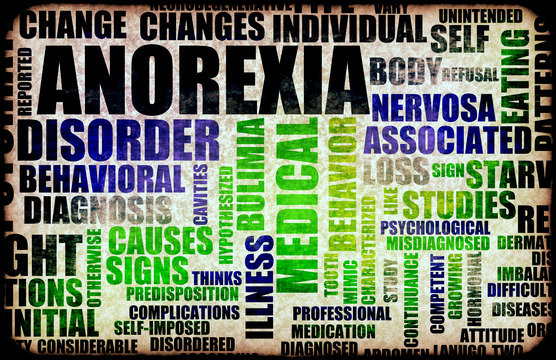
People who get help with mental health tend to get better faster and stay better longer.
Anorexia Nervosa
People with anorexia nervosa obsess about their weight and the food they eat.
People with anorexia nervosa may also have:
- Extreme thinness (emaciation)
- A relentless pursuit of thinness and unwillingness to maintain a normal or healthy weight
- Intense fear of gaining weight
- Distorted body image, a self-esteem that is heavily influenced by perceptions of body weight and shape, or a denial of the seriousness of low body weight
- Lack of menstruation among girls and women (amenorrhea)
- Extremely restricted eating
- Compulsive exercise
Other symptoms may develop over time, including:
- Thinning of bones (osteopenia or osteoporosis)
- Brittle hair and nails
- Dry and yellowish skin
- Growth of fine hair all over the body (lanugo)
- Mild anemia and muscle wasting and weakness
- Severe constipation
- Low blood pressure, slowed breathing, and pulse
- Damage to the structure and function of the heart
- Brain damage
- Multi-organ failure
- Drop in internal body temperature, causing a person to feel cold all the time
- Lethargy, sluggishness, or feeling tired all the time
- Infertility
- Chronically inflamed and sore throat
- Swollen salivary glands in the neck and jaw area
- Worn tooth enamel, increasingly sensitive and decaying teeth as a result of exposure to stomach acid
- Acid reflux disorder and other gastrointestinal problems
- Intestinal distress and irritation from laxative abuse
- Severe dehydration from purging of fluids
- Electrolyte imbalance (too low or too high levels of sodium, calcium, potassium, and other minerals), which can lead to heart attack.
Source: National Institute of Mental Health
People who get help when they have eating disorders tend to get better faster and stay better longer.
For more information on eating disorders:
http://www.nimh.nih.gov/health/topics/eating-disorders/index.shtml
http://www.apa.org/topics/eating
http://www.ulifeline.org/topics/131-eating-disorders
Get Support
